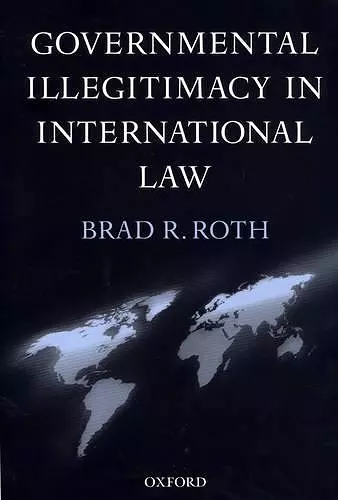Governmental Illegitimacy in International Law
Format:Hardback
Publisher:Oxford University Press
Published:28th Jan '99
Currently unavailable, and unfortunately no date known when it will be back
This hardback is available in another edition too:
- Paperback£69.00(9780199243013)

Winner 1998-1999 American Society for International Law Certificate of merit
This work seeks to specify the international law of collective non-recognition of governments. It subjects the recognition controversies of the United Nations era to a systematic examination, informed by theoretical and comparative perspectives on governmental legitimacy.When is a de facto authority not entitled to be considered a `government' for the purposes of International Law? International reaction to the 1991-4 Haitian crisis is only the most prominent in a series of events that suggest a norm of governmental illegitimacy is emerging to challenge more traditional notions of state sovereignty. This challenge has dramatic implications for two fundamental legal strictures: that against the use or threat of force against a state's political independence, and that against interference in matters `essentially' within a state's domestic jurisdiction. Yet although human rights advocates have begun to speak of state sovereignty as an `anachronism', with some expansively proclaiming the emergence of an international `right to democratic governance,' international law literature lacks systematic treatment of governmental illegitimacy. This work seeks to specify the international law of collective non-recognition of governments, so as to enable legal evaluation of cases in which competing factions assert governmental authority. It subjects the recognition controversies of the United Nations era to a systematic examination, informed by theoretical and comparative perspectives on governmental legitimacy. The inquiry establishes that the category of `illegitimate government' now occupies a place in international law, with significant consequences for the legality of intervention in certain instances. The principle of popular sovereignty, hitherto vague and ambiguous, has acquired sufficient determinacy to serve, in some circumstances, as a basis for denial of legal recognition to putative governments. This development does not imply, however, the emergence in international law of a meaningful norm of `democratic governance,' nor would such a norm serve the purposes of the scheme of sovereign equality of states embodied in the United Nations Charter.
a work of international legal scholarship * Chimene Keitner, Yale Journal of International Law Vol 25 2000 *
impressive work * Thomas D Grant Cambridge Law Journal *
Roth does an exceptional job of elucidating the issue. Recommended for upper-division undergraduates, graduate students, faculty, and practitioners. * Choice *
This is an interesting, thought-provoking, and well-written book ... replete with wisdom. * International Law and Trade Perspective *
- Winner of Winner 1998-1999 American Society for International Law Certificate of merit.
ISBN: 9780198268529
Dimensions: 242mm x 165mm x 29mm
Weight: 817g
470 pages